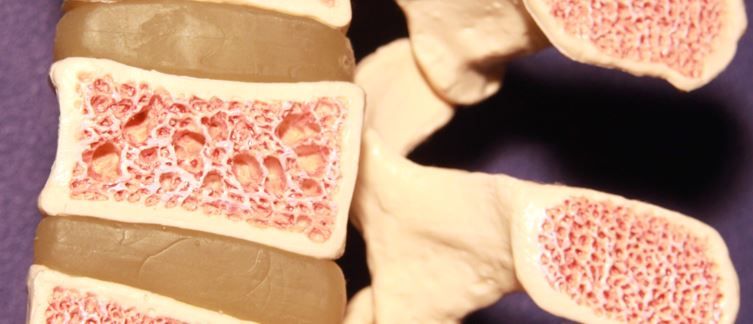Delaying Denosumab Injections Increases Risk of Vertebral Fractures, Study Shows
Delays to denosumab injections increase the risk of vertebral fractures, a study published in the Annals of Internal Medicine has shown, highlighting the importance of trying to ensure that, while covid-19 is disrupting many medical services, the pandemic does not impact on the timing of denosumab injections.
(©AdobeStock_259754779)

Delays to denosumab injections increase the risk of vertebral fractures, a study published in the Annals of Internal Medicine has shown, highlighting the importance of trying to ensure that, while COVID-19 is disrupting many medical services, the pandemic does not impact on the timing of denosumab injections.
Patients prescribed denosumab are meant to receive injections every six months, but delayed dosing is very common. Almost half of patients who have been on treatment long term have received at least one injections more than four months late.[i]
When patients come off denosumab therapy permanently, they are known to experience accelerated bone turnover, rapid loss of bone mineral density (BMD), and an increased rate of multiple vertebral fractures.
However, the impact of delays to denosumab is less clear. Guidelines recommend injections are delivered at strict six monthly intervals, and delays have been shown to be associated with reduced improvement in BMD,[ii] but the impact of delays on fracture risk have not previously been studied.
To address this researchers used data from the Health Improvement Network (THIN), an electronic database of 17 million patient medical records from primary care practitioners in the United Kingdom, to look at the impact of delays on fracture risk.
They identified 2594 patients aged 45 years or more who began denosumab therapy for osteoporosis between 2010 and 2019, had more than one injection spaced at least 150 days apart and who were not prescribed any other antiosteoporosis drugs. Patients were divided into three groups according to whether their second denosumab injection was given within 4 weeks after the recommended date (on time), within 4 to 16 weeks of the recommended date (short delay), or if injections were delayed by more than 16 weeks (long delay).
It was assumed that delays to further injections would have a similar impact to the impact of delays the second dose, so effect estimates on delays to the second, third and fourth injections were pooled. Overall, data on one injection was included 566 patients, two injections for 506 patients and three injections for 1522 patients.
The results showed that delayed denosumab dosing, beyond the recommended 6-month interval, likely leads to a higher risk of vertebral fracture in that initial six months, said Dr Houchen Lyu, a research fellow in the division of rheumatology at Brigham and Women’s Hospital, Boston. “This study adds important detail regarding the magnitude of fracture risk associated with delayed injections, emphasizing the importance of keeping to a relatively tight injection schedule every 6 months.”
The risk of a composite fracture in the 6 months following a repeat denosumab injection given in time was found to be 27.3 in 1000, compared with 32.2 in 1000 if there was a short delay and 42.4 in 1000 if there was a long delay.
The hazard ratio (HR) for a composite fracture after a short delay was calculated to be 1.03, compared to on time dosing, and that of a long delay was 1.44. The HR for a vertebral fracture was much higher - 1.48 for a short delay and 3.91 for a long delay.
Only for vertebral fracture was there a “clear and significant increased risk of vertebral fracture after a long delay, said Lyu, the evidence was insufficient to conclude that fracture risk was increased at other anatomical sites.
“Bone metabolism at the spine is rapid and thus more sensitive to these delays. We suspect that if we had a larger study, we would have observed similar statistically significant increases in risk at other sites,” he said.
Dr. Daniel Solomon, chief of clinical sciences in rheumatology at Brigham and Women's Hospital, said the study highlighted the need for physicians to counsel patients before the initiation of denosumab to educate them about the importance of not delaying or abruptly discontinuing injections, and to put in place systems to ensure timely administration. “Putting in place systems to improve on-time administration of denosumab, and all drugs, is important,” he said
While delayed injection is common, especially during the COVID-19 pandemic, disruption in denosumab administrations are more worrisome than some other delays in care. “Even in the setting of the COVID-19 pandemic, patients should work with their health care provider to receive regularly scheduled denosumab injections,” Dr. Solomon emphasized.
For those in whom continued treatment with denosumab is not feasible within seven months of their most recent prior injection, he added, the American Society for Bone and Mineral Research recommends “the temporary transition to an oral bisphosphonate.” “This is a very reasonable strategy but most patients can safely receive denosumab,” he said.
Current guidelines from the American Society for Bone and Mineral Research, American Association of Clinical Endocrinologists, International Osteoporosis Foundation, and American College of Physicians all recommend that administration of denosumab should not be delayed or stopped without subsequent antiresorptive agents to prevent a rebound in bone turnover and an increased risk of fracture.
This commendation is an “Ungraded Good Practice Statement)”, Solomon said. “The results of this study provide more data supporting this recommendation.”
______________
REFERENCES
Lyu H, Yoshida K, Zhao SS, Wei J, Zeng C, Tedeschi SK, Leder BZ, Lei G, Tang P, Solomon DH. Delayed Denosumab Injections and Fracture Risk Among Patients With Osteoporosis: A Population-Based Cohort Study. Ann Intern Med. 2020 Jul 28. doi: 10.7326/M20-0882. Epub ahead of print. PMID: 32716706.
[i] Lyu H, Zhao SS, Yoshida K, et al. Delayed denosumab injections and bone mineral density response: an electronic health recordbased study. J Clin Endocrinol Metab. 2020;105. [PMID: 31894244] doi:10.1210/clinem/dgz321
[ii] Lyu H, Zhao SS, Yoshida K, et al. Delayed denosumab injections and bone mineral density response: an electronic health recordbased study. J Clin Endocrinol Metab. 2020;105. [PMID: 31894244] doi:10.1210/clinem/dgz321